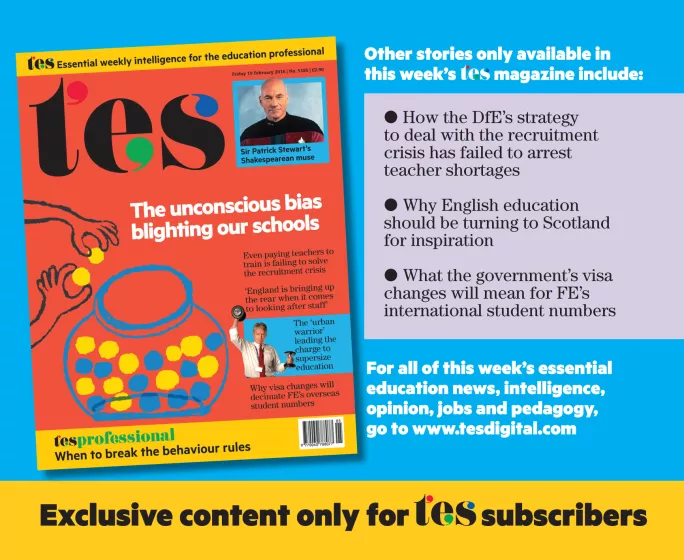- Home
- New visa restrictions are ‘last straw’, colleges say
New visa restrictions are ‘last straw’, colleges say

English colleges could lose one in 10 students from outside the European Union as a result of changes to visa regulations, new research suggests.
College leaders have warned that the Home Office’s decision to scrap the Tier 4 child visa for young people looking to study in the further education sector could affect as many as 2,000 learners - and cost providers millions of pounds in tuition fees.
A new survey by the Association of Colleges (AoC), shared exclusively with TES, reveals for the first time the likely impact of the Home Office’s move, announced in November, to remove this kind of visa for FE students.
‘Yet another obstacle’
The child visas have been widely used by international students aged 16 and 17 looking to attend college to take A levels. This allowed them to study in the UK without having to take English language tests. While these visas are still available for students attending independent schools, they can no longer be used for learners attending FE institutions.
About 18,000 students from outside the EU were enrolled in colleges across England in 2012-13, according to the most recent statistics.
The AoC survey generated responses from a third of colleges engaged in international work. In these institutions, about 10 per cent of students from outside the EU were on Tier 4 child visas. The NUS students’ union warned that the changes would create “yet another obstacle” for prospective students from overseas, and could lead to many opting to study in other countries instead.
With funding for 16-19 and adult learners having been reduced significantly since 2010, many colleges have turned to international recruitment to diversify their income. But a number have already been affected by the Home Office’s crackdown on student visas. In November, TES revealed that the number of college applications from outside the EU had halved in three years.
John Mountford, the AoC’s international director, warned that providers that recruited a significant number of A-level students would be seriously affected by not being able to use child visas.
Further changes to visa rules compound the difficulties for colleges. Under the new regulations, visas are limited to a maximum of two years for sub-degree-level programmes. And students are also no longer able to extend their stay to start a higher-level course, but must first return home and then apply to return to the UK.
The AoC survey finds that in 2015, approximately half of Tier 4 students were studying A levels or the international foundation year programme, with 77 per cent of learners progressing to university afterwards.
“We are a genuine sector, working with genuine students, and it is a frustration that the government is putting these barriers in place,” Mr Mountford said. “There should be a broader understanding of what the college offering is all about, along with policies that reflect that.”
Students opt out
Shelagh Legrave, principal of Chichester College, told TES that the number of students there on Tier 4 visas had dropped from 126 two years ago to 78 this year - a direct result of the change in visa regulations. “The last change was the straw that broke the camel’s back,” she said, adding that losing 48 students, who would each have paid about £7,000 in tuition fees, had resulted in the college missing out on £336,000.
Recruitment agents told the college that the UK visa system had become so difficult to navigate that prospective students were opting for other countries instead, Ms Legrave added.
Mostafa Rajaai, international students’ officer for the NUS, said that forcing students to leave the UK and apply for a new visa from their home country was “yet another obstacle that will ensure fewer students are interested in continuing their studies here”.
A Home Office spokesman said that the UK “continues to welcome international students”, but stressed that the student visa changes had been introduced to “tackle immigration abuse among students in further education”.
“Colleges [that] recruit international students can continue to do so but must ensure their students have Tier 4 (general) visas. There is no need for those coming for an adult education to use a Tier 4 (child) Student visa,” he added.
@JBelgutay
‘Big loss of income’
Itchen Sixth Form College in Southampton has experienced a drop in international applications compared with previous years, according to assistant principal Tim Proud.
In particular, not being able to use child visas is a “significant problem”, he says. “We offer A levels, but some of those kids are not ready for A-level study in terms of their level of English.”
Because of this, the college used to offer an introductory year focusing on English language, leading on to a two-year A-level programme. For the first year, many students were on a Tier 4 child visa, before moving on to a general student visa. “That can no longer happen,” Mr Proud says. “We are either forcing some students into A levels they are not ready to do or rejecting them.
“We are seriously concerned. It is a big loss of income.”
This is an article from the 26 February edition of TES. This week’s TES magazine is available in all good newsagents. To download the digital edition, Android users can click here and iOS users can click here

Want to keep up with the latest education news and opinion? Follow TES FE News on Twitter and like TES FE News on Facebook
Keep reading for just £1 per month
You've reached your limit of free articles this month. Subscribe for £1 per month for three months and get:
- Unlimited access to all Tes magazine content
- Exclusive subscriber-only stories
- Award-winning email newsletters



